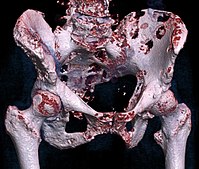
Photo from wikipedia
Metastatic bone disease in patients with advanced cancer is frequently associated with skeletal complications. These can be debilitating, causing pain, impaired functioning and decreased quality of life, as well as… Click to show full abstract
Metastatic bone disease in patients with advanced cancer is frequently associated with skeletal complications. These can be debilitating, causing pain, impaired functioning and decreased quality of life, as well as reduced survival. This review considers how the management of metastatic bone pain might be optimised, to limit the considerable burden it can impose on affected patients. Cancer-related pain is notoriously under-reported and under-treated, despite the availability of many therapeutic options. Non-opioid and opioid analgesics can be used; the latter are typically administered with radiotherapy, which forms the current standard of care for patients with metastatic bone pain. Surgery is appropriate for certain complicated cases of metastatic bone disease, and other options such as radiopharmaceuticals may provide additional relief. Treatments collectively referred to as bone-targeted agents (BTAs; bisphosphonates and denosumab) can offer further pain reduction. Initiation of therapy with BTAs is recommended for all patients with metastatic bone disease because these agents delay not only the onset of skeletal-related events but also the onset of bone pain. With evidence also emerging for pain control properties of new anticancer agents, the potential to individualise care for these patients is increased further. Optimisation of care depends on physicians' thorough appreciation of the complementary benefits that might be achieved with the various agents, as well as their limitations. Appropriate anti-tumour treatment combined with early initiation of BTAs and adequate analgesia plays a key role in the holistic approach to cancer pain management and may minimise the debilitating effects of metastatic bone pain.
Journal Title: European journal of cancer
Year Published: 2017
Link to full text (if available)
Share on Social Media: Sign Up to like & get
recommendations!